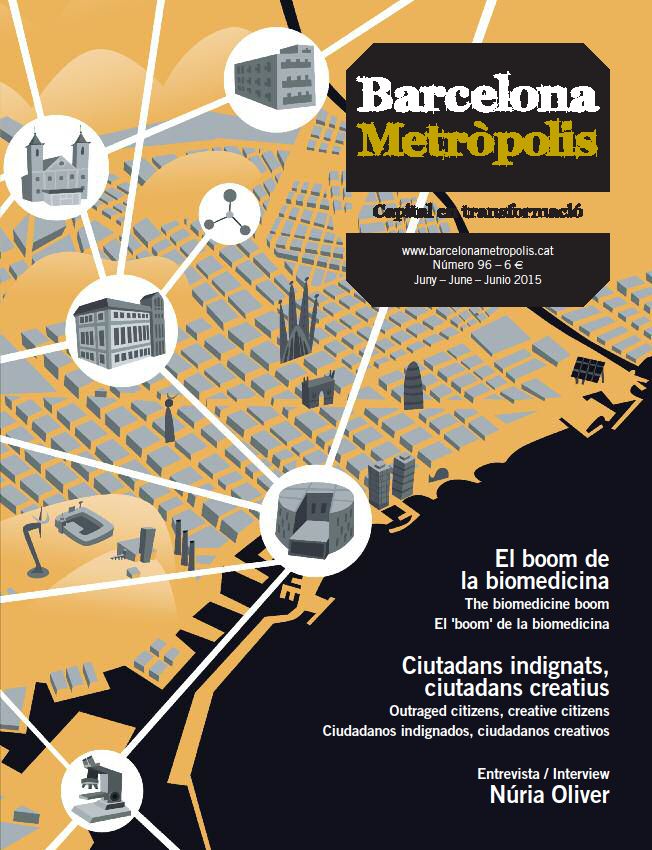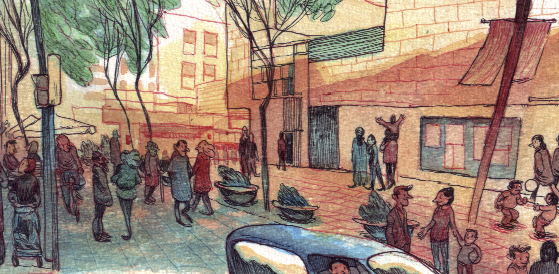Set apart from the tourist hubbub and the rising flood of cars, in Fort Pienc we get on with our daily business with dogged determination.
In the midst of so many recent commemorative tributes, it’s surprising no politician has seen fit to change Fort Pienc. The neighbourhood’s name originates from the fort built for King Philip V by Francisco Pío de Saboya y Moura, where Estació del Nord stands today.
Nowadays, the area has strategic value for those of us who wish to enjoy a village lifestyle inside the city of Barcelona. We’ve made this our stronghold, and we’ll defend our borders with the bravery of our day-to-day routines. We’re blessed with three state schools, one secondary school, a civic centre and library, and countless supermarkets, Chinese shops and Bangladeshi or possibly Pakistani shops – I’m never quite sure which they are. There are a great number of kids, and they say it’s the youngest neighbourhood in central Barcelona. Some degree of generational relieving of duties is occurring. Passeig de Sant Joan forms a natural border, and beyond that the streets are deserted come the weekend. But here in my village life never stops: old ladies hold court in dairy bars and cafés, dog-owners in the park by the station; football fans get together in their bars, young people in a former Bankia branch reclaimed by the neighbourhood; and the Chinese locals… well, they tend to stick to their own establishments.
As in all neighbourhoods worth their salt there is a police station, which is run by the Guardia Urbana, who never tell off any of the children who climb up to play on the magnolias next to their patrol cars, sometimes as many as six climbing up. We get our provisions from the Fort Pienc market, where there’s always fresh wild fish. A kiosk selling newspapers and magazines is still holding on, but two photo-printing shops have recently closed down. There’s an old-fashioned hardware store, where helpful advice is given to those who – like me – aren’t so handy, as well as a shop selling its own design dresses.
In the mornings when I take my son to school, I’m fortunate enough to talk to people from France, Uruguay, Argentina, China, Turkey, Colombia, Peru, England, Ukraine, Italy, Morocco, and of course locals and Iberians. Some are artists, others bank employees, actors, writers, engineers, graphic designers, teachers, biologists, nurses, chemists, musicians, and the list goes on; so many nationalities and so many professions in this small universal village where each one has built a life. One day conversation is about the war in Ukraine with the owner of the stationery shop, another day about Erdogan’s fickleness with a Turkish consulate worker, and the next about the Pixies’ performance at the last Primavera Sound with an employee of a multinational, whose job hasn’t dented his enthusiasm. It’s at this special time of day when the village atmosphere is at its most tangible, its most idyllic. The neighbours know you and you know them, and we give each other a few minutes to celebrate our ability to share time and space, and the pleasure of being able to walk our children to school without having to put them on a bus or use the car each morning. It all makes for a brief lull before you rush on to try to fit everything in before the day is done; one of those moments when time seems to come to a halt.
Set apart from the tourist hubbub and the rising flood of cars, with dogged determination we have made our stronghold here in Fort Pienc, getting on with our daily business, taking our children to school, shopping in the neighbourhood stores. From time to time we make a trip into Barcelona and discover how marvellous life could be for its people if we could make it both village-like and cosmopolitan at one and the same time. And yes, Fort Pienc is “child friendly”. May it serve as an example!




